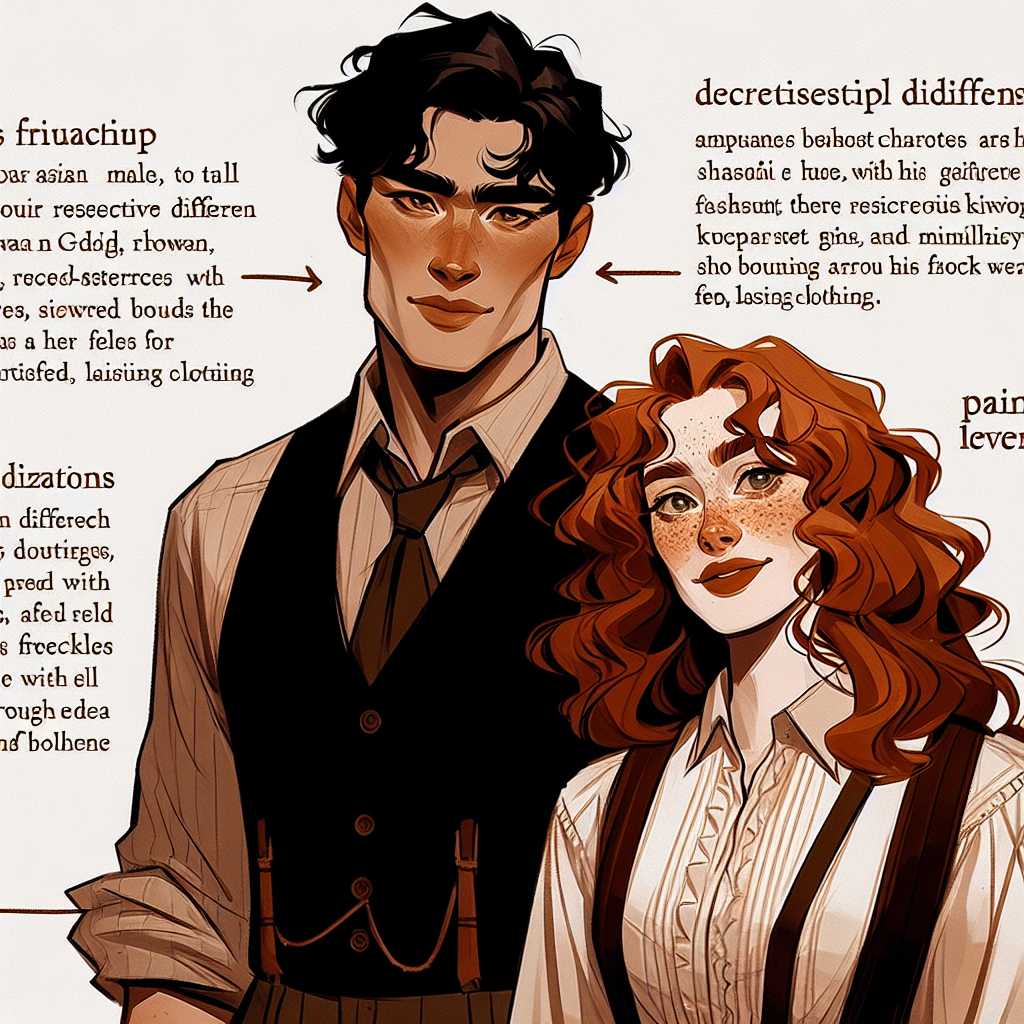
The Jewel of the Nile
Amidst the sprawling city of Thebes, beneath the golden gaze of the statuesque gods, there lived a young scribe named Ramose. He was not of noble blood, yet within him coursed the fervor for knowledge and the quill's dance upon papyrus. It was within the vast corridors of the grand library, where scrolls nestled like nesting doves, that he first laid eyes upon her—the Pharaoh's niece, the raven-haired beauty known as Nefret.
Her presence was like a desert breeze, breathing life into the stilted air. Each day, she wandered amidst the scrolls and tomes, her fingers trailing over the wisdom of the ages, her eyes alight with the fires of curiosity and intelligence. Nefret, whose intellect rivaled that of any scholar, sought to unravel the mysteries of stars and the secrets of the before-time.
Ramose, captivated by her grace and brilliance, felt an ember of love ignite within his chest, yet he dared not reveal his affection. For what could a mere scribe offer a maiden of royal descent? Still, the heart yearns ever strongly, paying no heed to the logic of men. And so, they came to speak, to share discourse on matters of the cosmos and the gods' eternal machinations.
"Tell me, Ramose," Nefret once inquired, her voice a melodic incantation, "do you believe that destiny is written in the stars, or do we weave it with our choices?"
He pondered moments before replying, "Perhaps it is both, my lady. The gods draft the parchment on which our stories unfold, yet it is by our hand that the tale is scribed."
Unbeknownst to them, others also took notice. Whispers scurried through marbled halls like scarabs scuttling in the darkness. There was talk of a scribe ensorcelling a princess's eyes, of impropriety and the folly of youth. In those days, words held power, and rumors wielded the force of a chariot's charge.
It was during the opulent celebration of the Nile's inundation when calamity struck. A precious amulet, a veritable jewel of the Nile, vanished from the Pharaoh's palace. This was no mere trinket but an heirloom from the gods, an earthly representation of the Pharaoh's divine right to rule.
The Whispered Accusation
When the theft was discovered, the celebrations soured, fear spreading like kohl running in the desert heat. It was amongst this tumult that a voice rose, piercing the commotion like the sting of an asp. Ptahmes, a vizier, as envious as he was ambitious, whispered poisonous words to the Pharaoh.
"Great lord," Ptahmes murmured, bowing low with feigned deference, "foul whispers have reached my ears. The scribe, Ramose, has grown too familiar with royal matters, besmirched your niece's honor, and, I fear, laid hands upon the sacred jewel."
Glyphs of anger etched themselves upon the Pharaoh's brow as he summoned Ramose. The scribe, falling to his knees before the sun-crowned Pharaoh, proclaimed his innocence, yet his pleas were but wheat before the scythe—the sentence was death, to appease both the gods and the people. But Nefret, upon hearing of her beloved's fate, unveiled before the court what truly lay within her heart.
"Great Pharaoh," she declared, her voice a clarion call above the din, "to condemn the innocent is to darken the eye of Ma'at, to bring imbalance where there should be order. Ramose is no thief of amulets nor a stealer of virtue. If compassion lives within you, seek out the truth lest we all be judged in the afterlife for this grievance."
Her words rang with such conviction that even the stone-hearted Ptahmes felt their weight. In his hubris, Ptahmes had underestimated the Princess. Now, she challenged the Pharaoh and, by extension, all of courtly society.
Divine Revelation
In the end, it was the gods who intervened. During the night, as Ramose awaited his fate in a cell as confining as a sarcophagus, Anubis, guardian of the scales, came to Nefret in a vision. He revealed to her the true location of the jewel and the identity of the real thief.
Awakening with divine purpose, Nefret hastened to the Pharaoh, imploring him to allow her one final search before Ramose's execution. Reluctantly, the Pharaoh consented, and with due haste, a search was conducted.
Lo and behold, the jewel was discovered hidden amidst the finery of Ptahmes' quarters. In a cruel twist of irony, the vizier, in his greed, had ensnared himself in his web of treachery. Ptahmes was apprehended and, following a trial before his peers, was condemned to the very fate he had wished upon Ramose.
Ramose, now freed by the hands of the gods and his beloved, rose in stature. The Pharaoh, grateful for the return of his amulet and the dismissal of disgrace from his court, appointed Ramose as his new vizier. Higher he would climb, though never above Nefret, for she was his equal in love and intellect, and together, they would ensure that Ma'at—the divine order—reigned.
Thus concludes this tale, spun from the threads of history and imagination— a story where wisdom overcame malice, where the pursuit of truth proved mightier than the sword, and where love intertwined with the fates and whispered secrets of the divine.
And they say that the Nile still carries whispers of Ramose and Nefret, where the papyrus rustles with their memory, and the stars gaze down upon the land, eternal witnesses to their tale...










